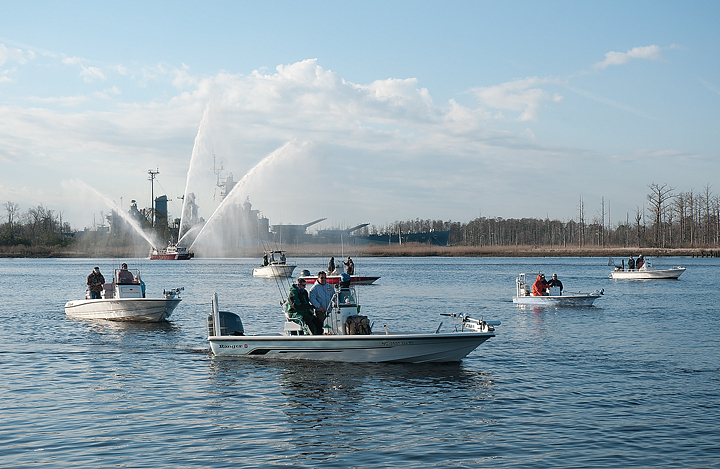State fishery regulators heard public comments this week on a proposal to limit commercial fishing operations in North Carolina. The year’s first government meeting regarding an ongoing dispute pitting shrimpers against recreational anglers set the stage for a key February meeting in Wilmington.
Tuesday, the North Carolina Marine Fisheries Commission advisory panels voted against the proposed rules limiting the size, areas and times that commercial shrimpers could operate in North Carolina. During Feb. 15-16 meetings at the Wilmington Convention Center, the full commission will consider the advisory panel’s votes before it decides on the petition for new rules filed by the North Carolina Wildlife Federation.
The federation’s petition asks the commission to limit trawling to three days a week, reduce the size of nets, expand fish nursery areas to all state estuarine and ocean waters and eliminate night trawling, which is currently permitted.
The proposed new rules highlight worries brought by recreational fishermen, who are concerned that the bycatch of other fish from commercial shrimp-trawling operations will destroy game fish populations. Meanwhile, representatives of the state’s fisheries said commercial shrimpers have already made net modifications that significantly alter bycatch and that further restrictions could heavily impact business.
The issue has ignited passion from both sides. Media coverage of Tuesday’s meeting in New Bern reports the line of speakers was so long that not everyone in line had an opportunity to be heard.
Wrightsville Beach State Rep. Ted Davis, R-19th District, has said that he would support more limits to the trawlers, arguing that the disparity of regulations in Virginia and South Carolina are bringing more boats to the state and making an impact on the commercial regulations. In fact, Davis said the issue may be raised in the North Carolina House of Representatives’ Wildlife Resources Committee.
“One of the tasks we’ll focus on is how to define what is a commercial fisherman. It may seem easy, but it’s not,” Davis said.
Davis said limiting trawling was needed to “protect the resources” in North Carolina waters.
“The main problem is that if you wipe out the small fish, then you don’t have the big fish,” he said.
Jerry Schill, president of the North Carolina Fisheries Association, said the proposed regulations would be “devastating” to the state’s commercial fishermen. Schill said commercial fishing operations in North Carolina have been working to reduce bycatch since the 1980s.
“It didn’t take a state mandate, the fishermen did it themselves,” Schill said. “It takes the wind out of your sails. You are working to reduce bycatch and then the legislature wants to restrict it or ban it all together.”
David Sneed, executive director of the North Carolina Coastal Conservation Association, said by reducing the size of the boats and nets in inshore areas, four-and-a-half pounds of bycatch are lost for every pound harvested during shrimp fishing.
“The inshore is where fish grow up,” he said. “They’re three to five inches long here and if they’re caught in the nets, they’re dead and discarded while they cull out the shrimp.”
Sneed said because trawling is more open in North Carolina, boats are coming in from South Carolina and other areas where the practice is banned.
“We’re the last state that allows inshore trawling the way we do. Most states ban inshore trawling,” Sneed said. “By making this change, fish stocks would be impacted up and down the coast.”
However, Schill noted that South Carolina and Virginia don’t have large inshore fishing areas like the Pamlico Sound, which is what he said makes North Carolina different, and supports the state’s diverse commercial fishing industry.
“It’s an ocean, really, and already over 50 percent is closed to shrimp trawling,” he said.
Schill said that further restricting shrimp trawling wouldn’t just affect the fishermen, but also the fish house owners across the state, who want to buy domestic shrimp, not stocks raised in Asia. Gene Long, owner of Motts Channel Seafood in Wrightsville Beach, agreed, noting that years of state regulations against shrimping have virtually eliminated shrimping in the town.
“From 27 years ago, there’s been an incredible change,” Long said. “There is zero commercial fishing around here now. There used to be eight to 10 shrimp boats tied to the docks, but I haven’t seen a shrimp boat in 10 years.”
He said that groups like the CCA were misinformed about the issue, arguing that stormwater runoff pollution has had a greater impact on recreational fish stocks than any of the shrimping regulations.
“They’re pointing the finger at the wrong people,” Long said. “You’d be surprised at how much is closed to shrimping. There are already areas where everything can breed.”
Email [email protected]




